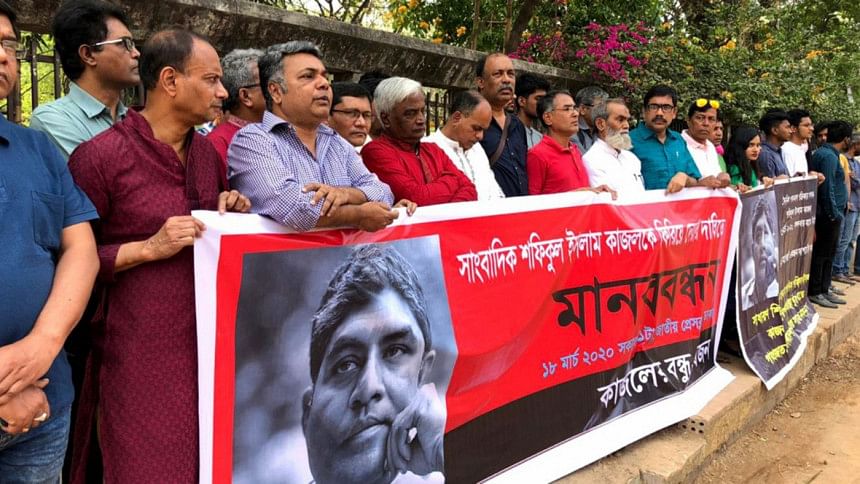A new trend in disappearance cases

The law has repeatedly been side-lined in recent years by law enforcers, who have illegally abducted or "picked up" people and detained them secretly in custody, without following due legal process. Some were later released, while others remained indefinitely "disappeared" (or "goom") in what are known as enforced disappearance cases.
Over the last two years, a new dimension has emerged in such enforced disappearance cases—where cases are filed against people subsequent to their detention under laws such as the Digital Security Act—which journalists, human rights activists, and people from many sectors alike have expressed concerns about, for its curbing effect on freedom of expression.
This act is now newly connected with the culture of "goom", as law enforcement agencies are taking it upon themselves to silence people who are expressing views that are seen as "anti-government" or anti-state agencies, and prevent these views from entering into the public discourse by abducting them illegally. In this way, law enforcement agencies are dangerously side-lining the judicial system and acting as both judge and jury as well as violating citizen's fundamental rights as guaranteed in the constitution and under domestic law.
The phrase "picked up" indicates illegality i.e. abduction. Police and law enforcement agencies cannot "pick up" people—they can only arrest. Arrest and abduction are two different things. Abduction is taking someone away from lawful custody i.e. their home, whereas a person is arrested when they commit an offence under the law—the two have different consequences.
But the language we hear is that someone was picked up at night by peopleinplainclothes in a car without number plates. For example, in April this year, Didarul Alam Bhuiyan was "picked up" for his allegedly "anti-government" comments on Facebook. When he was picked up, the law enforcers were not wearing uniforms though at the time of the Supreme Court judgment regarding Section 54 of the CrPC, it was clearly laid down that those without uniform/outside their working hours cannot arrest anyone. When this arrest was taking place, law enforcers were still on duty—just working the night shift. Day or night, why aren't they wearing their uniforms if they're working? Without uniforms and identification, law enforcement agencies have no authority to enter into private premises. They need a warrant from the court that they can enter into a house to arrest a particular person.
When Didarul was "picked up", there was no case against him under the DSA or any other act. Therefore, there was no legal justification for arresting him or entering his premises. It was a violation of Didarul's rights and that of his family's, safeguarded in the constitution, to liberty and safety.
It is also a violation under sections 54 and 167 of the Code of Criminal Procedure 1898. Section 54 of the CrPC lays down when the police can arrest someone based on suspicion. This section was modified by the HC division and subsequently upheld by the appellate division in 2015 (judgement formally came on April 24, 2016). Section 167 of the CrPC is about police taking people to remand. This was also modified by the HC which gave the 15-point directives. The court's observation regarding sections 54 and 167 was that the fundamental rights guaranteed in the constitution would be violated based on certain provisionsand thus needed to be modified and separate directives given.
Section 54 is important, because when there is no criminal case against Didarul, on what basis can the police go to his house, arrest him, or even question him? They could only do so if they follow the SC directives on it. Under the original law, if a police officer suspects or there is any reason to believe a person has committed an offense or will commit one, then the officer can arrest that person without a warrant and without an order from a magistrate.
The SC modified this so this "suspicion" has to be reasonable and it has to be noted by the officer in a diary as to why he suspects someone and their activities and what he or she has witnessed of the suspect's activities. When a person is arrested, they are also supposed to be produced before the court within 24 hours, he or she should be notified that they can make a call to their family and to a lawyer. If they have no mobile on them, the police have to provide means of communication for them.
In case of such "disappearances", the opposite has happened. When Didar's family was looking for him at thanas and RAB offices, they were told he had not been brought in anywhere.
That's the point at which these cases become "goom": when you're not following any judicial process, you are denying that you arrested him, you did not arrest him on a specific case's warrant, and after bringing him in say you do not have him under your custody. There was no account of his whereabouts for two days, and after these two days, cases against him (and 11 others) were filed under the DSA.
As the case was filed two days after his disappearance, the whole process is illegal. That is an enforced disappearance.
Earlier this year, this happened with journalist Shafiqul Islam Kajol. The case against him was filed on March 9 this year by Saifuzzaman Shikhor. On March 10, he "disappeared" in the evening. He was found after 53 days in the border town of Benapole and the story circulated was that he was trying to enter back into the country without a valid passport.
In the meantime, his wife filed a case with the Chawkbazar police station saying that her husband had gone missing/was abducted since March 10. There is no progress in that case, the police did not say a word regarding the outcome of the investigation of that case. Basically, they did not carry out any investigation. Where was he? The responsibility lies with the state to tell us where he was these 53 days. If the state says he crossed the border without a passport and he was hiding in India, in that case they need to prove it. They need to give us an explanation of what happened during those 53 days—because there is a case pending at Chawkbazar police station.
He was abducted before he was shown formally arrested in a particular case. There is now subsequently a case under the Passport Order, 1973 at the Benapole port police station and three cases filed under the DSA against him—one in Sher-e-Bangla Nagar police station, another in Hazaribagh police station, and the third in Kamrangirchar police station.
But look at the process. The cases were there [since March] but there was no investigation, no application showing him for arrest after the cases were filed, and then after 53 days, he was shown formally arrested. In the Sher-e-Bangla case, he was shown arrested on June 23 but he was arrested from the border on May 3.
Look at the time and look at the gap. First, they are grabbing people, holding them in their custody without any explanation and without following any judicial or legal procedure at all. Then, they are planting a case against that particular person and forwarding him before the learned magistrate for further judicial procedure.
The judicial system is crippled and thus we are failing to make law enforcement agencies accountable and answer for such actions.
Another dimension, indirectly related to enforced disappearances, emerged during photojournalist Shahidul Alam's case last year.
When someone is accused, no matter by a state agency or any individual, they are accused not guilty. Until proven guilty in a trial, convicted by a competent court, the law needs to treat the person as innocent.
"Innocent until proven guilty" is not just a rhetoric but a guiding principle in criminal proceedings. While innocent and even after found guilty of a particular crime following a trial, the person's fundamental rights cannot be waived.
If a person under police custody is beaten or tortured, under the Torture and Custodial Death (Prevention) Act, 2013, action needs to be taken against the police. In this particular torture case, the person is a victim, despite being accused in another case. When the law enforcement agency hits or physically assaults a person or commits some type of physical or mental torture, then that person becomes a victim.
The accused in enforced disappearance cases are getting no such protection and we have not been able to get any legal forum to effectively address these questions and ensure their fundamental rights are safeguarded.
The Constitution is the supreme law of the country. Law enforcers are supposed to follow it.
When someone is being "picked up" or "goom"—for a complaint for which there could be various elements, as is seen, personal/political vested interests—the violations of the legal system is dangerous to every citizen's safety. That means, this legal protection and fundamental rights exist only on paper.
Jyotirmoy Barua is an advocate of the Supreme Court.
As dictated to Maliha Khan.

 For all latest news, follow The Daily Star's Google News channel.
For all latest news, follow The Daily Star's Google News channel. 



Comments